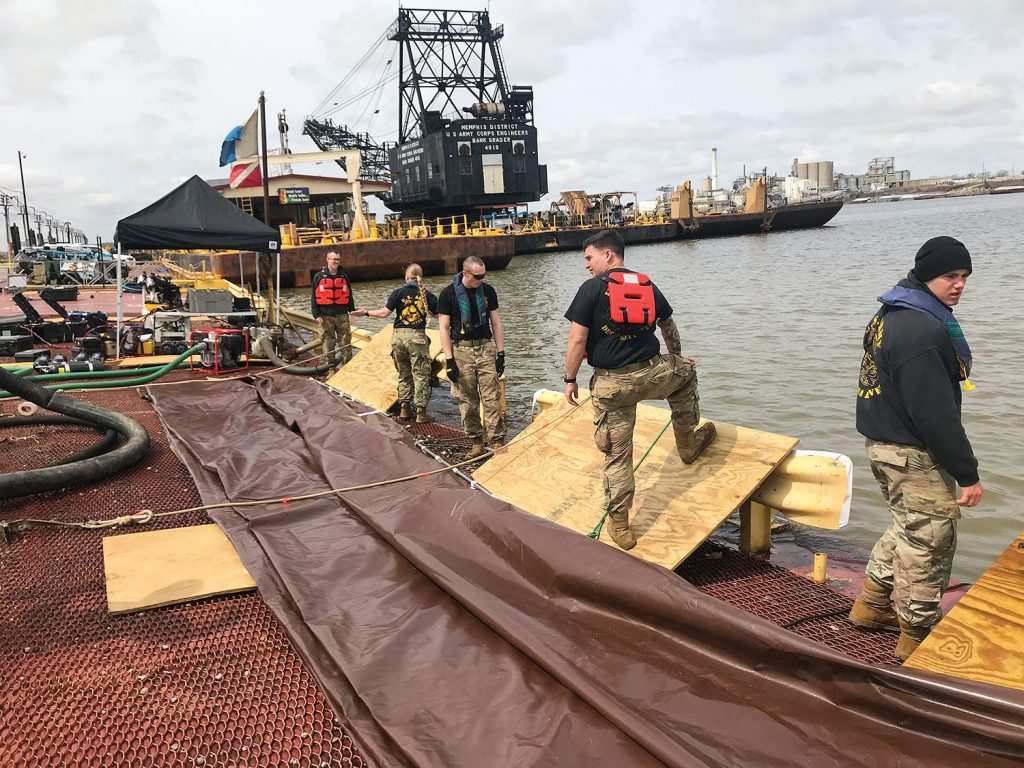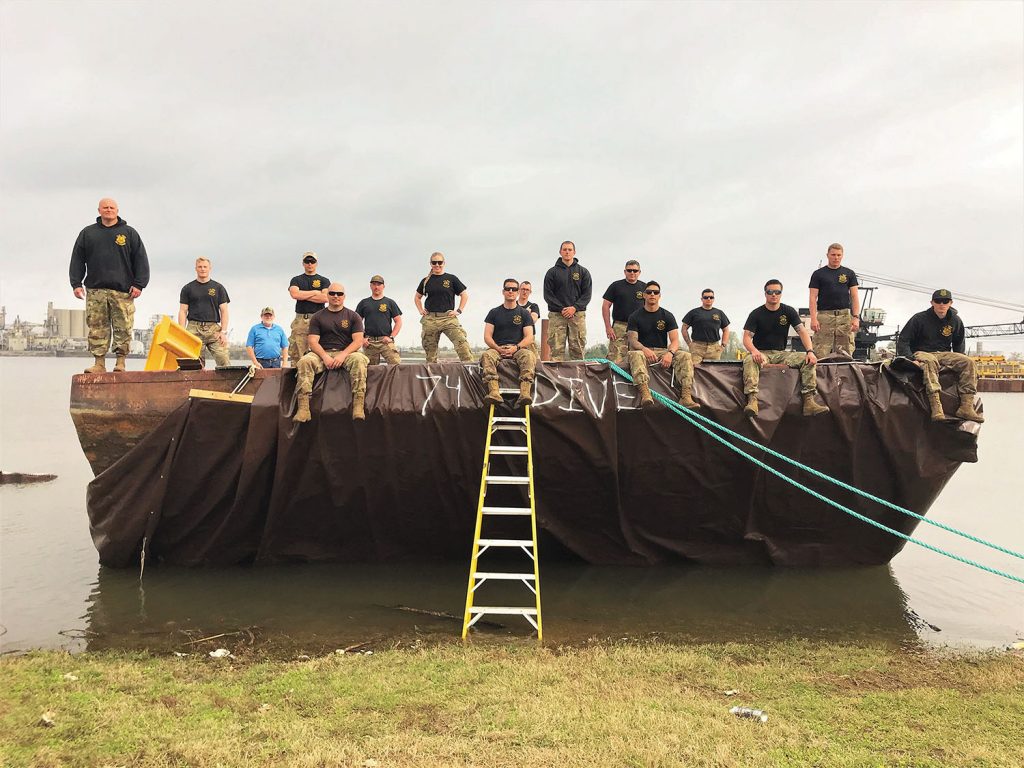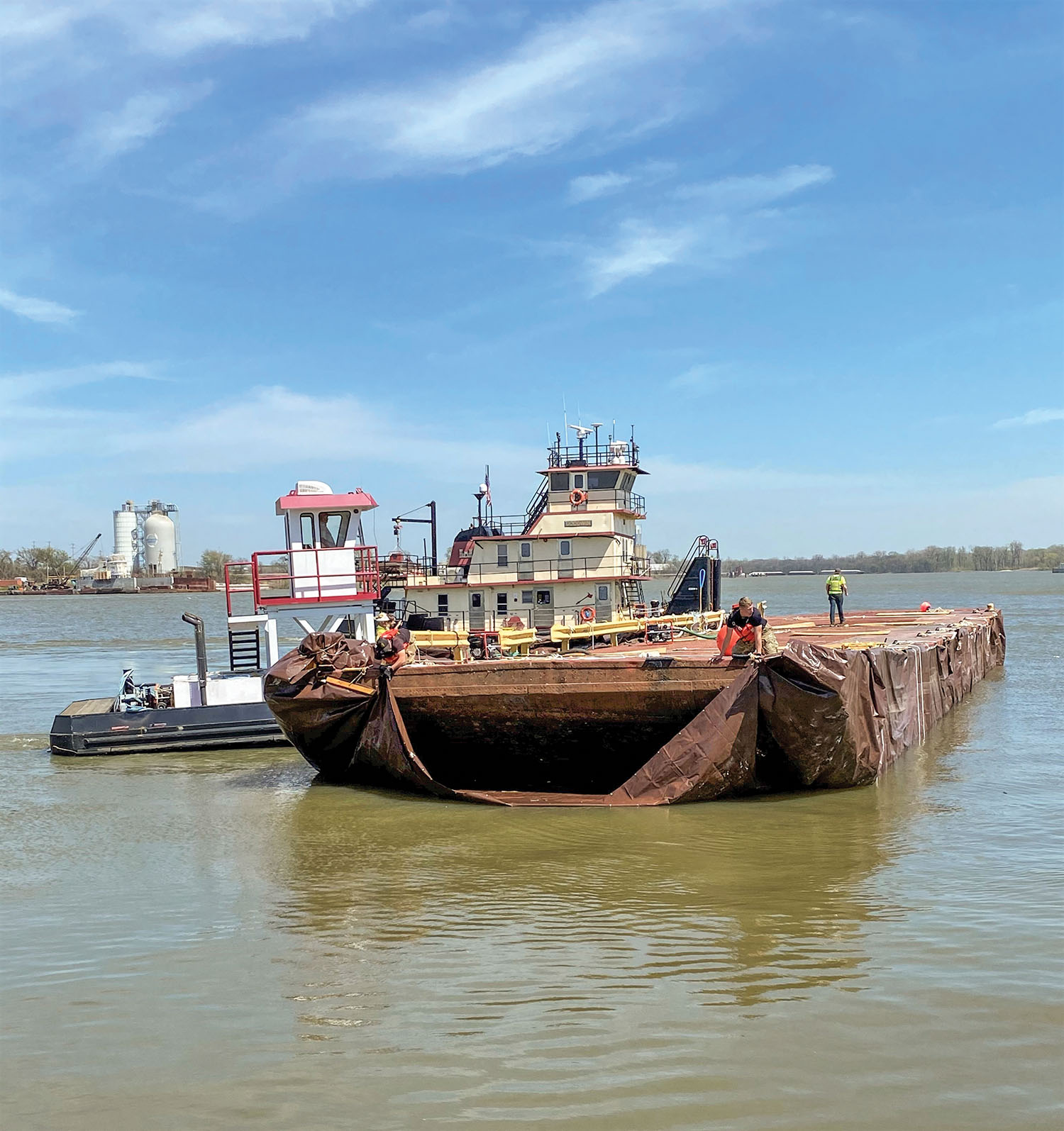By Jessica Haas
Public Affairs Specialist
Memphis Engineer District
The 74th Army Dive Detachment Team, with the help of several Ensley Engineer Yard skilled tradesmen, recently repaired sections of a highly critical structure at the Memphis District Ensley Engineer Yard. The vital structure this team spent time repairing is known as the stringout, which to many might look like a pier or dock.

“The stringout is approximately 5,445 feet of floating wharf running generally in an east/west orientation,” said Chad Chrisco, marine facilities and equipment specialist. “The stringout serves as a docking facility to support maritime mission operations including dredging and revetment vessels, barge mounted cranes, tugboats and crew boats. It also supports vessel repair drydock facilities.”
Chrisco said the stringout consists of barges that are 1900–1945 vintage and have been in use at Ensley since the 1960s.
“Some of the barges have been foam-filled to keep them afloat while pumping of a number of barges is ongoing to keep them afloat,” Chrisco said. “Due to wear and tear and just the sheer fact that the stringout is old in age, removal and replacement of the barges becomes necessary from time to time.”
The dive team started working March 2 and had been scheduled to stop work on March 26, but due to the coronavirus pandemic, the dive team’s future jobs were canceled, so the teams worked together to keep the detachment there for an additional week to complete more repairs on the east ramp.
“The 15-person dive team successfully removed one barge from the string-out,” Chrisco said. “All eight compartments of the barge were totally flooded as divers reported that the bottom of the barge had more holes than Swiss cheese. They held several brainstorming meetings using creativity, teamwork and dedication to work through the process to come up with a solid plan to get the barge stable enough for removal and transfer to the bank.”
Chrisco said the team used plugs, plywood patches with glued salvage matting, to perform a seal. They used three heavy-duty tarps that wrapped the hull to assist in sealing the pin holes, as well as around the installed plywood patches.

“Before deploying the tarps, the threaded rods that were used to hold the patches in place had to be cut off at the wing nuts that were used to tighten the patches down, then tennis balls were placed over the wing nut to prevent the tarps from being damaged during deployment,” Chrisco further explained.
Ensley Engineer Yard personnel from the Safety, Metals, Shops, Yards and Docks departments, the MAT Loading Unit, Bank Grading Unit, Clearing and Snagging, mv. Grugett, mv. Goodwin, office staff and District Dive Coordinator Kevin Pigott all played a big part in the success of this mission.
“Members from each team were called on to do things that varied from making threaded rod anchors and ordering parts and supplies and an underwater scaffold for the divers to work from to moving heavy equipment and supplies from job site to job site,” Chrisco added. “The confined space rescue team assisted with air monitoring, the metals shop fabricated materials to assist in pumping out the flexi floats and cutting the metal straps that attached the barge to surrounding barges, the motor vessels assisted with towing the salvaged barge to the west bank. … It was a total team effort.”
With the failing barge completely removed from the stringout, the mv. Goodwin maneuvered a replacement barge into place the same day, leaving Ensley Engineer Yard better prepared to support maritime operations for many more years to come.
“This mooring facility is well situated along the inland system and can be used strategically to provide repair services for more than just the Memphis District; it can be used by the entire Corps fleet,” commented Chrisco. “This critical work doesn’t just benefit our district.It serves to benefit the entire Mississippi Valley as well.”
This article originally appeared on the Memphis Engineer District’s website. It is reprinted with permission.
Caption for top photo:The mv. Goodwin and Ensley Engineer Yard’s truckable towboat remove the barge from the stringout and reposition it for transit to the west bank of the engineer yard for disposal while Army divers attach the front edge of the tarp for transit. (Photo courtesy of the Memphis Engineer District)




